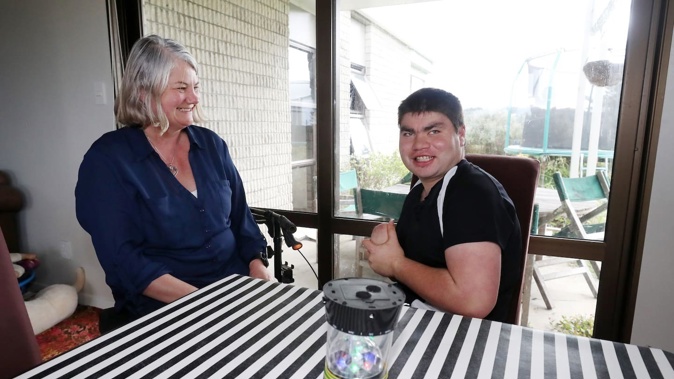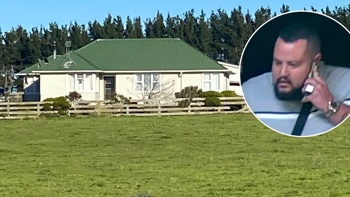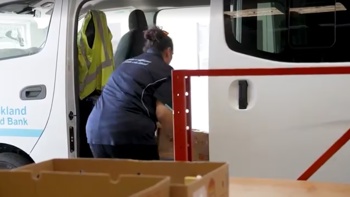
When Whaikaha - Ministry of Disabled People suddenly announced new restrictions to its purchasing rules last month, it meant huge changes to people with disabilities and their whānau. As Northland has a high percentage of disabled people, reporter Denise Piper spoke with one Whangārei family to understand what the changes mean for them.
Kristy Kewene loves her son James very much but admits caring for him is often a handful.
The 23-year-old has autism, cerebral palsy, global development delay, and a heart condition which caused a stroke when he was young, leaving him unable to talk, shower and dress himself.
James also has other medical issues, including seizures, musculoskeletal pain and depression, and has a long list of medications to take.
Kristy describes him as like a 3-year-old who often throws tantrums. However, he is not a young child - he is a 23-year-old man with the strength to match.
“He’s thrashing around and if someone’s in the way they might get hurt... He’s intense.”
Kristy and husband Brett’s Kauri home has borne the brunt of this violence over the years.
Walls and doors have had to be covered with tough material or still show the wounds from James’ punches and kicks. Lights are recessed so they can’t be smashed, and the family’s living room is bare of ornaments, TVs and pictures.
James’ bedroom includes a TV, high on the wall protected by clear plastic, plain blue walls and wardrobe door with kick holes.
The home’s ranchsliders will need to be replaced with toughened glass, at an expense of $2600, Kristy said.
James has one caregiver during school hours and a second on weekday afternoons, to enable Kristy and Brett to work. But after 6pm, the couple are on their own juggling caring for their son and getting some much-needed sleep.
James’ sometimes violent nature also means the Kewenes are unable to accommodate their grandchildren, aged 1 and 3, and they have to snatch small moments with them and their older daughter.
“We just love our son but it’s really hard,” Kristy said.
Previously, James was funded to go into respite care one weekend a fortnight, giving Kristy and Brett time to catch-up on sleep and housework. However, a lack of staff to manage his high needs means the respite care is no longer able to take him.
Kristy Kewene says she loves her son James but caring for him takes a toll. Photo / Michael Cunningham
The whānau qualify for $15,000 a year from Whaikaha - Ministry of Disabled People to spend on respite, as part of its individualised funding programme.
Kristy said she and Brett organised a carer to come into their home - where James feels comfortable and they are long past worrying about items being smashed - while they stayed for two nights in a hotel.
The couple could not get a proper rest staying in their own home, even while a carer was there, because James would just smash on their door and want attention, she said.
“It’s not like we’re living the high life,” Kristy said.
“Having the hotel was huge - we would just go there and sleep all Saturday or lie in bed and watch TV. It was lovely, it was such a weight off.”
The Kewenes had just two weekends away when Whaikaha suddenly announced changes to the purchase rules for the individualised funding, cracking down on how the funds could be used.
While the maximum of $15,000 a year remains, the funds can only be spent on a carer - not on a hotel or anything for Kristy and Brett’s relief.
The changes leave them feeling like they have done something wrong, Kristy said.
“It’s like they don’t trust me to use that money. I’m not a thief,” she said.
“That money is no longer there for us to have respite - that’s wrong. Our kids are difficult, we need to have this... there’s nothing to help us.”
Other parents of disabled children also have to stop spending their funding on things like massages, which Kristy said are needed for those lifting their disabled child.
The Kewenes have little funds to pay for the accommodation themselves, after they cover the costs of house repairs, new clothes needed for James and a dedicated car for his carers to use.
The couple run a forestry business but Kristy said her earning potential has been severely cut because of caring for James: She had to leave her full-time chartered accounting job two years ago because she was unable to find a day carer and now works on contract four days a week.
They would prefer respite care or a fulltime residential facility for James - especially because he loved the respite care and having a break from his parents - but options are very limited in Northland, she said.
With the disabled sector being under funded in the north, Kristy said the Government could at least continue the flexible funding for families.
“If you think I’m being frivolous, then put the money into bricks and motor respite care homes or training people really well so there’s lots of caregivers.”
Changes to ensure money spent on disabled people, ministry says
Whaikaha - Ministry of Disabled People said the changes were to address pressure on funding and ensure those with the highest need are prioritised.
In a video to the disabled community, Whaikaha chief executive Paula Tesoriero apologised for the stress and anxiety caused by the way the funding changes were announced.
“These changes were needed because we have seen a significant and ongoing increase in demand for our supports. It was important for us to act immediately.”
Tesoriero said she and the disability issues minister will now work on broader changes for the upcoming financial year, to put the system on a “more sustainable financial footing”.
Disabled people, tāngata whaikaha Māori, carers and whānau will be able to have a say in these decisions to ensure the funding is spent where it is most needed, she said.
In March, then-Disability Issues Minister Penny Simmonds said the changes were not a reduction in funding but were necessary to ensure the funding was used as intended to help disabled people
However, Simmonds was stripped of the portfolio on Wednesday, with Prime Minister Christopher Luxon saying “major financial issues” in the ministry’s programmes have been discovered and it is important to have a senior cabinet minister consider the issues.
Louise Upston, who is also Social Development and Employment Minister, has taken up the portfolio.
Denise Piper is a news reporter for the Northern Advocate, focusing on health and business. She has more than 20 years in journalism and is passionate about covering stories that make a difference.
This article was originally published on the NZ Herald here.
Take your Radio, Podcasts and Music with you









